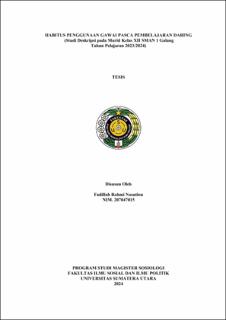Habitus Penggunaan Gawai Pasca Pembelajaran Daring (Studi Deskripsi pada Murid Kelas XII SMAN 1 Galang Tahun Pelajaran 2023/2024)
The Habitus of Gadget Usage Post-Online Learning (Descriptive Study on Grade XII Students of SMA Negeri 1 Galang, Academic Year 2023/2024)

Date
2024Author
Nasution, Fadillah Rahmi
Advisor(s)
Munthe, Hadriana Marhaeni
Elida, Linda
Metadata
Show full item recordAbstract
The Covid-19 pandemic brought significant changes to the education sector. Gadgets and the internet emerged as effective tools during online learning. Students of SMA Negeri 1 Galang have become accustomed to using gadgets and various learning applications, making gadgets valuable and essential. The habitus of gadget usage became increasingly ingrained after online learning. This study aims to examine the extent of gadget usage habitus among Grade XII students of SMA Negeri 1 Galang during the 2023/2024 academic year. This research employs a qualitative approach with a descriptive method. The findings reveal that the intensive use of gadgets during online learning has transformed students' interactions with technology. Habits formed through gadget usage influenced students' lives and fostered new behaviors. The study employs Pierre Bourdieu's concepts of habitus, field, and capital for analysis. The school, family, and pandemic served as fields that shaped the habitus of gadget usage. The pandemic compelled students to rely on gadgets for learning without adequate planning or strong digital literacy preparation. In terms of power relations, students dominated teachers and parents in gadget usage, leading to a cultural lag among these groups. Post-online learning, gadgets became a means of social capital, enabling students to interact and build friendships more easily. Gadgets also served as symbolic capital, where their model, brand, and price defined social status as "cool" among students. As cultural capital, gadgets highlighted students who could skillfully use applications and utilize gadgets for learning and positive activities, earning them recognition as "smart" by peers. Economically, gadgets became a tool for students to earn money and engage in online transactions. However, post-online learning, the habitus of gadget usage shifted predominantly toward gaming, social media, entertainment, shopping, and online transactions rather than educational activities. Consumerism and instant gratification emerged as consequences of this gadget usage habitus.
Collections
- Master Theses [71]
